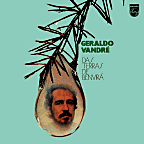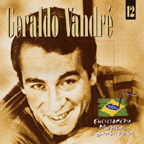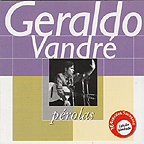
![]() I have to confess, I haven't totally got a handle on 1960s singer-songwriter Geraldo Vandre, who was one of the leading lights of the intensely politicized, early-edition Brazilian MPB scene of the early 1960s. Vandre was one of a cadre of strident artists, admired for their open defiance of the dictatorship that took power in 1964, but perhaps a bit of a drudge and a downer for other artists -- particularly rock-oriented musicians -- who were trying to move beyond the rigid nationalistic definitions of "Brazilian" art that Vandre espoused. (I'm mostly getting this from the autobiography of superstar Caetano Veloso, who, like Vandre, went into political exile at the height of the dictatorship...) Over the decades, as the ideology of Brazilian art has softened, Vandre's stock has risen, and his image as a tedious scold has diminished. His records are still mostly out of print, which is unfortunate, since some of his musically more challenging material gets left off of the best-of collections, in favor of the more straightforward, folkie-sounding anthems. Anyway, here's a quick look at his work.
I have to confess, I haven't totally got a handle on 1960s singer-songwriter Geraldo Vandre, who was one of the leading lights of the intensely politicized, early-edition Brazilian MPB scene of the early 1960s. Vandre was one of a cadre of strident artists, admired for their open defiance of the dictatorship that took power in 1964, but perhaps a bit of a drudge and a downer for other artists -- particularly rock-oriented musicians -- who were trying to move beyond the rigid nationalistic definitions of "Brazilian" art that Vandre espoused. (I'm mostly getting this from the autobiography of superstar Caetano Veloso, who, like Vandre, went into political exile at the height of the dictatorship...) Over the decades, as the ideology of Brazilian art has softened, Vandre's stock has risen, and his image as a tedious scold has diminished. His records are still mostly out of print, which is unfortunate, since some of his musically more challenging material gets left off of the best-of collections, in favor of the more straightforward, folkie-sounding anthems. Anyway, here's a quick look at his work.
Geraldo Vandre "Geraldo Vandre" (Audio Fidelity, 1964)
Geraldo Vandre "Hora Da Lutar" (Continental, 1965) (LP)

Geraldo Vandre "5 Anos De Cancao" (Som Maior, 1966)
Geraldo Vandre "Canto Geral" (EMI-Odeon, 1968)

 Geraldo Vandre "Das Terras De Benvira" (Phonogram, 1973) (LP)
Geraldo Vandre "Das Terras De Benvira" (Phonogram, 1973) (LP)

(Produced by Geraldo Vandre)
Trying, apparently, to liberate himself from his image as a folk-scene political grind, Vandre went for a big, trippy, psychedelic freak-out album, rapidly descending into a sludgy, drone-heavy, masturbatory downward spiral. This is a dreadfully pretentious, downbeat album, with Vandre yelping and intoning over stark, sombre arrangements: minimally strummed acoustic guitar and a somewhat random-sounding, noodly harmonica. It's challenging, and innovative, in its own way -- indeed, he sounds a lot like Dutch-French troubadour Dick Annegarn, utterly earnest and slightly unlistenable. On Side Two, he broke things up a little and got into some different spacey soundscapes, but it still didn't grab me. Yes, he was trying something new, but it was still kind of a drag. Of course, that may mean this is actually a hippie-era classic -- guess it depends on your point of view.
Geraldo Vandre "20 Preferidas"

Geraldo Vandre "Mestres Da MPB" (Warner, 1994)

 Geraldo Vandre "Encyclopedia Musical Brasileira" (Warner, 2000)
Geraldo Vandre "Encyclopedia Musical Brasileira" (Warner, 2000)

A frequent participant in the mid-'60s Brazilian song festivals, political activist Vandre's style was a mix of mainstream pop and earnest folkie troubadour tendencies -- the Gateway Singers meet Joao Bosco. On first listen, I didn't really care that much for this album -- it seemed a bit mainstream and bland -- but after a while it grew on me. Vandre's vocals aren't amazing, but there is something appealing and intimate about them, and while he doesn't have a groovy psychedelic band behind him, there's a restrained experimentalism to his arrangements. This disc, which covers his work from 1965-'68, is an interesting glimpse at the other kinds of music which were out there when the tropicalia movement was coming to fruition, as well as a clear precursor to the later, more mainstream approach of the '70s MPB scene. It's also almost all original material -- he wrote or co-wrote all but two of these songs. Apparently Vandre was one of the more prominent artists suppressed early on by the Brazilian dictatorship which took power in the 1960s, and spent several years in European exile.
 Geraldo Vandre "Perolas" (Som Livre, 2002)
Geraldo Vandre "Perolas" (Som Livre, 2002)

An equally appealing album, and possibly better programmed than the Warner collection listed above. Vandre's passionate conviction comes across loud and clear (as well as hints of his more humorless, dreary tendencies...) A highlight of this disc is a live recording from one of the many song festivals that Vandre competed in, where his spoken introduction to "Para Nao Dizer Que Nao Falei Das Flores" incites the highly-charged crowd to split along political lines, half the audience fervently applauding him, the other half howling with derision and outrage; when the song begins, his supporters take it up with the moblike passion of a soccer crowd. It gives us a whiff of what the political passions of Brazil in the 1960s were like, as does the rest of this fine album... Apparently, Vandre was arrested immediately after performing the song, leading to a lengthy period of exile in the late '60s and early '70s.
Quinteto Violado "Canta Geraldo Vandre" (Atracao, 1997)





